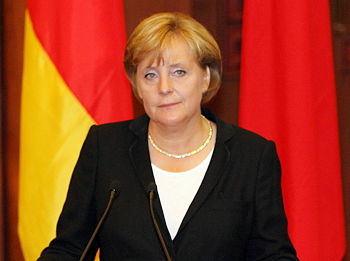Germany’s obstinate chancellor
固执的德国总理
Angela Merkel, swimming instructor
“游泳教练”安吉拉·默克尔
When it comes to the euro, the German chancellor prefers self-help to help—but she can be more flexible than she seems
德国总理在欧元问题上嘉勉自救胜过人救,不过她这个表面上的立场仍可通融。
WHEN warnings sound that the end of the euro is nigh, all eyes turn to Angela Merkel, the German chancellor. Germany must “assume its part” in saving the currency, says Spain’s economy minister, Luis de Guindos. If there is rescuing to be done, Germany is the obvious rescuer. Yet rather than toss out the lifebelt, Mrs Merkel offers swimming lessons.
欧元瓦解的警报就将拉响,所有人的目光都聚焦在德国总理安吉拉.默克尔的身上。西班牙财政部长金多斯(Luis de Guindos)说,德国必须在拯救欧元的行动中“承担相应的责任”。若真有国家亟待救援,德国显然是拯救者。然而,默克尔女士却选择站在岸边教游泳,而非抛出救生圈。

She would find this characterisation unfair. Time and again she has taken stands against bail-outs only to relent. She balked at bailing out Greece and at a permanent rescue fund, and she vetoed the use of bail-out money to buy government bonds in the secondary market. In each case she gave in (too late,say critics).
默克尔女士也许会认为此般描述有失公正。她一次又一次地反对纾困, 到头来却总是松口让步。她在救助希腊和永久性救援基金上踌躇不决,还否决了利用纾困资金在二级市场上购买国库券。以上事件她都做出了妥协(可惜为时已晚,批评家如是说)。
By July she will push through parliament the European Stability Mechanism(ESM), the permanent fund she once opposed, and Europe’s fiscal compact.Germany’s capital contribution to the ESM will push its budget deficit from 26 billion($32 billion) to 35 billion. Germany’s potential liability, if all the money is lent and everyone defaults, could be 280 billion. But her partners want more: Eurobonds backed by all countries,more time for weak economies to meet deficit-reduction targets, direct lending to Spanish banks and a “banking union”, with Europe-wide deposit insurance.Will Mrs Merkel yield on these, too? Do not count on it.
7月前,默克尔将推动议会通过欧洲“财政契约”,以及她曾经反对的永久性援助基金——欧洲稳定机制(ESM)。德国向ESM的注资会将联邦政府的财政赤字从原来的260亿欧元(320亿美元)扩大至350亿欧元。如果德国投入的资金全部借出,且统统遭到违约,德国将会面临2800亿欧元的潜在负债风险。 然而,默克尔的同僚们想要的不止这些,他们希望发行所有成员国支持的“欧洲债券”,给疲软经济体更多时间,用以完成赤字削减目标,直接向西班牙银行贷款,以及成立带有欧洲通用的储蓄保险的“银行联盟”。默克尔女士是否也会此一一退让?别抱太大希望。
Despite her retreats, she sees herself as a defender of principle.Everything to which Germany has assented has been part of a bargain:peripheral countries get help, but only in exchange for reform. Aid from the European Financial Stability Facility (EFSF), the ESM’s precursor, is conditional. Greek bail-outs came with crushing demands (which Greece may reject after its election on June 17th). The ideas urged by Francois Hollande, France’s new president, and Mario Monti, Italy’s primeminister, would break her principle, say the Germans. To introduce Eurobonds as a crisis-fighting measure would only encourage less creditworthy countries in their spendthrift ways. Similarly for centralised deposit insurance, which would enlist German banks (and ultimately the state) as guarantors of other countries’ savings.
尽管默克尔有所让步,她仍视自己为原则的卫道士。但凡德国赞成的,都是议价的一部分:外围国家获得救助的前提是,他们要进行改革。ESM的前身,欧洲金融稳定基金(EFSF)的救助款也有附加条件。纾困希腊伴随着一系列严酷的要求,而在6月17日大选后,希腊也有可能予以拒绝。德国方面称,法国新总统奥朗德(Francois Hollande)和意大利总理马里奥(Mario Monti)极力推崇的观点有违默克尔的原则。以欧洲债券作为抗危机措施,只会助长信誉度较低的成员国挥霍无度的气焰。设立中央储蓄保险的目的也亦如此。该储蓄保险会令德国的银行(继而整个德国)成为其他国家储蓄的担保人。
Such proposals “bear on the core issue: do debt and responsibility remain linked to each other?” asks Norbert Barthle, a member of the Bundestag from MrsMerkel’s Christian Democratic Union. Any instrument that severs the link wil lperpetuate the crisis. Besides, such measures are forbidden by Germany’sconstitution. That is not to say they can never happen. But they are imaginable only if the EU becomes more of a federal state, with a common fiscal policy anda parliament that reflects Germany’s share of the population. Mrs Merkel wants “more Europe”.But that requires “treaty changes, and we are not there yet today”.
此番提议“涉及的核心问题是:债务和责任间是否依旧存有联系?”,联邦议院议员,默克尔所属基民党的成员巴斯勒(Norbert Barthle)问到。任何隔断此种关联的工具都会使危机继续蔓延。此外,德国宪法明令禁止采取此类措施。这并不意味着该措施永无实现之日。只有欧盟成为一个联邦式的国家,具有统一的财政政策,并配有依据德国人口数分配席位的议会的情况下,才有实现可能。默克尔女士要的是“大欧洲”。但这需要“修改条约,而今我们还没走到那一步”。













